Trump Restricts Health Care for Trans Minors
The president's executive order prohibits federal funds from being spent by institutions providing gender-affirming care to people under 19.
By John Riley on January 29, 2025 @JRileyMW

Donald Trump signed an executive order restricting people under the age of 19 from accessing medical treatments or procedures intended to help them undergo a gender transition.
The order, issued on January 28 and titled “Protecting Children from Chemical and Surgical Mutilation,” prohibits federal funds from being used to cover the cost of such treatments for minors.
The order also directs federal agencies to ensure that medical schools and hospitals receiving any research or education grants are not conducting research on — or providing minors with access to — gender-affirming treatments.
The order directs all federal agencies to rescind guidance from the World Professional Association for Transgender Health (WPATH), a nonprofit association that has adopted guidelines for how and when gender-affirming treatments are to be administered to transitioning individuals.
Critics of WPATH have claimed that the organization’s more recent guidelines were based on a political or ideological stance rather than on science.
Trump’s order asserts that “impressionable children” are being lied to and pushed to pursue transition-related treatments that will lead to sterilization and “lifelong medical complications.” It also claims that a large number of minors who do seek out gender-affirming treatments will eventually come to regret their decision to transition.
The order requires TRICARE (the Department of Defense’s insurance plan), Medicaid, and federal employee health insurance plans to refuse to cover the costs of gender-affirming treatments prescribed to minors.
It directs the Department of Justice to “prioritize investigations” of medical providers who “may be misleading the public about long-term side effects of chemical and surgical mutilation.”
Twenty-six states have passed laws restricting individuals under the age of 18 from accessing certain types of gender-affirming care. However, a recent study published in JAMA Pediatrics earlier this month found that less than 0.1% of adolescents with private insurance in the United States are transgender and have been prescribed either puberty blockers or hormone therapy.
And yet, Republican politicians have seized on anti-transgender sentiment as a cultural wedge they can use to rally voters to their side in elections.
Most major medical associations, including the American Medical Association, the American Academy of Pediatrics, and the American Psychological Association, have opposed state-level attempts to restrict access to gender-affirming care.
The Williams Institute, an LGBTQ policy think tank, estimates there are about 300,000 transgender youth aged 13 to 17 in the U.S. About one-third of them are believed to live in states with restrictions on gender-affirming care.
“Only eight days into his second term, President Donald Trump has blood on his hands,” Rodrigo Heng-Lehtinen, the executive director of Advocates for Trans Equality, said in a statement.
“This executive order not only prohibits but intends to set forth a path to potentially criminalize the provision of safe, evidence-based, medically necessary gender-affirming care, endangering the lives of tens of thousands of transgender adolescents under the age of 19.”
Heng-Lehtinen continued, “Denying trans youth medical care will not stop them from being trans. Our trans community survived long before the government ever recognized us.… Trans existence is unyielding, and we will endure.”
The Gender Research Advisory Council + Education (GRACE), a transgender advocacy group, accused Trump of bending to the will of conservative activists who authored Project 2025. The blueprint for conservative governance calls for eradicating LGBTQ legal protections and refusing to recognize transgender identity.
GRACE asserted that the executive order strips away the rights of parents, who previously had been allowed to make medical decisions for their children. It has also criticized the hypocrisy of Republicans, who frequently trumpet the idea of “parental rights” when it comes to educational curricula, and who were vehemently opposed to mask and vaccine mandates during the COVID-19 pandemic.
“Our nation is witnessing firsthand the attempted eradication of people who are transgender,” GRACE Founder and President Alaina Kupec, said in a statement. “Our dehumanization by religious extremists is starkly similar to what took place in 1930s Germany.
“When our country’s leaders like President Trump and [House] Speaker [Mike] Johnson [R-La.] use the weight of the government to promote a radical agenda denying our existence, all Americans should stand up and take notice. It may start with the transgender community, but as history has proven, it will not stop with us.”
Subscribe to Metro Weekly magazine and newsletter for free.
More from Metro Weekly:
Man Slashed on NYC Subway for Kissing Trans Partner
The 28-year-old victim was treated at Bellevue Hospital as the NYPD Hate Crimes Task Force joined the search for the unidentified assailant.
By John Riley on January 20, 2026 @JRileyMW
A New York City subway rider was slashed in the face earlier this month by an unidentified assailant who took offense to him kissing his transgender partner. The attack occurred around 7:50 p.m. on January 10 aboard a southbound No. 6 train as it traveled through Manhattan.
According to police, the 28-year-old victim was kissing his partner when the suspect began shouting anti-gay slurs. The verbal abuse quickly escalated into a physical confrontation. During the argument, the suspect struck the victim with a sharp object, causing a deep laceration on the right side of his face, according to New York CW affiliate WPIX.
University of Oklahoma Fires Transgender TA Who Failed Student
The university says the firing followed a grading dispute over an essay that cited the Bible and described transgender people as "demonic."
By John Riley on December 26, 2025 @JRileyMW
In late November, the University of Oklahoma placed Mel Curth on administrative leave after the transgender graduate teaching assistant gave a student a zero on an essay about gender roles.
The essay cited the Bible to defend traditional gender roles and described transgender people as "demonic." Curth and the course's instructor, Megan Waldron, said the paper failed to meet basic academic standards due to a lack of empirical evidence. Both noted that the paper cited no scholarly sources and failed to offer an evidence-based critique of the assigned article, which argued that children who do not conform to rigid gender stereotypes are more likely to face bullying and negative mental health outcomes.
ICE Agent Fatally Shoots Queer Woman in Minneapolis
DHS officials claim Renee Good used her car as a weapon to run over federal agents, but video footage appears to contradict those claims.
By John Riley on January 8, 2026 @JRileyMW
A masked Immigration and Customs Enforcement officer fatally shot a queer woman in Minneapolis after opening fire through the window of her SUV during a confrontation in the street.
Video footage posted online shows two masked ICE officers approaching a Honda Pilot stopped in the middle of Portland Avenue near 34th Street in Minneapolis' Powderhorn neighborhood. One agent can be heard yelling at the SUV's driver -- later identified as 37-year-old Renee Nicole Good -- telling her to "get out of the fucking car" while attempting to open the driver's door, as a second officer stands back.
Support Metro Weekly’s Journalism
These are challenging times for news organizations. And yet it’s crucial we stay active and provide vital resources and information to both our local readers and the world. So won’t you please take a moment and consider supporting Metro Weekly with a membership? For as little as $5 a month, you can help ensure Metro Weekly magazine and MetroWeekly.com remain free, viable resources as we provide the best, most diverse, culturally-resonant LGBTQ coverage in both the D.C. region and around the world. Memberships come with exclusive perks and discounts, your own personal digital delivery of each week’s magazine (and an archive), access to our Member's Lounge when it launches this fall, and exclusive members-only items like Metro Weekly Membership Mugs and Tote Bags! Check out all our membership levels here and please join us today!
The Magazine
-
Most Popular
 LGBTQ Lawmakers Condemn Killing of Alex Pretti by ICE
LGBTQ Lawmakers Condemn Killing of Alex Pretti by ICE  Transphobes Rage Over Dylan Mulvaney’s Casting in Six
Transphobes Rage Over Dylan Mulvaney’s Casting in Six  Former Space Force Colonel Bree Fram to Run for Congress
Former Space Force Colonel Bree Fram to Run for Congress  Judge Rejects DOJ Effort to Charge Don Lemon
Judge Rejects DOJ Effort to Charge Don Lemon  Mercy Promises Big Ideas -- and Delivers Nothing
Mercy Promises Big Ideas -- and Delivers Nothing  Chicago-Area Teen Used Sniffies to Lure and Rob Uber Driver
Chicago-Area Teen Used Sniffies to Lure and Rob Uber Driver  Win Tickets to Bianca Del Rio
Win Tickets to Bianca Del Rio  Gay Porn Star Austin Wolf Gets 19 Years for Child Sex Crimes
Gay Porn Star Austin Wolf Gets 19 Years for Child Sex Crimes  Jason Elliott on His Year as Mr. Mid-Atlantic Leather
Jason Elliott on His Year as Mr. Mid-Atlantic Leather  Rob Jetten Becomes Netherlands’ First Openly Gay Prime Minister
Rob Jetten Becomes Netherlands’ First Openly Gay Prime Minister
 Win Tickets to Bianca Del Rio
Win Tickets to Bianca Del Rio  Judge Rejects DOJ Effort to Charge Don Lemon
Judge Rejects DOJ Effort to Charge Don Lemon  LGBTQ Lawmakers Condemn Killing of Alex Pretti by ICE
LGBTQ Lawmakers Condemn Killing of Alex Pretti by ICE  Mercy Promises Big Ideas -- and Delivers Nothing
Mercy Promises Big Ideas -- and Delivers Nothing  Transphobes Rage Over Dylan Mulvaney’s Casting in Six
Transphobes Rage Over Dylan Mulvaney’s Casting in Six  Former Space Force Colonel Bree Fram to Run for Congress
Former Space Force Colonel Bree Fram to Run for Congress  Gay Alexandria Councilman Wins Delegate Primary
Gay Alexandria Councilman Wins Delegate Primary  Texas Judge Upholds Campus Drag Ban, Likens it to "Blackface"
Texas Judge Upholds Campus Drag Ban, Likens it to "Blackface"  Chicago-Area Teen Used Sniffies to Lure and Rob Uber Driver
Chicago-Area Teen Used Sniffies to Lure and Rob Uber Driver  Man Slashed on NYC Subway for Kissing Trans Partner
Man Slashed on NYC Subway for Kissing Trans Partner
Scene
Metro Weekly
Washington's LGBTQ Magazine
P.O. Box 11559
Washington, DC 20008 (202) 527-9624
About Us pageFollow Us:
· Facebook
· Twitter
· Flipboard
· YouTube
· Instagram
· RSS News | RSS SceneArchives
Copyright ©2025 Jansi LLC.















You must be logged in to post a comment.